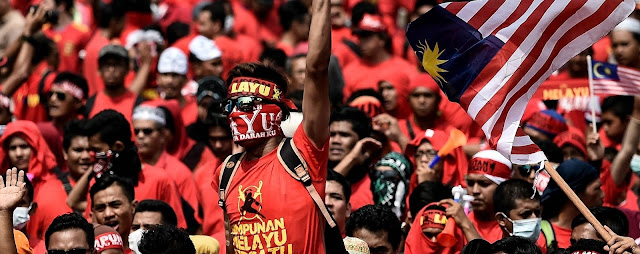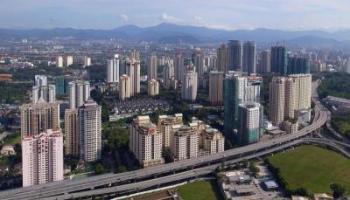"If we want to be tuan (master), we need to have knowledge, willingness to be hardworking, do things properly and not steal. Don't fellow the example of our previous prime minister (Datuk Seri Najib Tun Razak" said Dr. Mahathir:
Dr M: All races to be consulted on ICERD first
How to be supreme!
Here’s a plea to reconsider an unpalatable term favoured by certain politicians and nationalists.
Tsk, tsk, tsk. Can our dear politicians stop fighting? That’s what they keep telling us, don’t they?
If it is a Malay politician, he is fighting for Malay rights. If it’s an Indian leader, he’s fighting for Indian rights. If it’s a Chinese bloke, he’s fighting for... You get the drift.
Instead of the aggressive and violence-laden word, “fighting”, how about they use words like “promoting”,
“protecting” or “nurturing”?
I actually like another word more: “sharing”. I wish politicians will say things like, “Let me share what the Malay community’s thoughts and concerns are so that we can address them together.”
The word “Malay” can be substituted by any of the following: Chinese, Indian, Iban, Kadazan, Orang Asli, Muslim, Christian, Buddhist, Hindu, etc.
And why should it be so? Because we share this nation. It’s as simple and obvious as that.
The soil, air and water we all need to live have no boundaries when it comes to pollution, global warming and diminishing resources that affect us collectively.
Because when our economy gets bad, everyone suffers – jobs are lost, crimes increase, prices go up... You get the picture. If that happens, will fighting over community rights or racial supremacy help?
That’s why this endless debate over Malay supremacy – ketuanan Melayu – is so pointless and unnecessary.
Why do people get all riled up whenever it comes up, the latest being our youngest Cabinet member, Youth and Sports Minister Syed Saddiq Abdul Rahman, who said on Saturday the era of ketuanan Melayu had ended under the Pakatan Harapan government?
He went on to give the assurance that this did not mean the needs of the Malay community would be sidelined but that Putrajaya now preferred to emphasise the concept of “shared prosperity” to ensure fair and equitable distribution of wealth across all races.
Somehow that was misconstrued by some quarters and Tan Sri Muhyiddin Yassin, Parti Pribumi Bersatu Malaysia president and Home Minister, had to step in to explain and defend his young colleague. And how was Syed Saddiq misconstrued by the likes of Majlis Belia Negeri Johor?
Well, its president Md Salleheen Mohamad was quoted as saying that Syed Saddiq needed to understand Malay supremacy in the historical context.
He added that it wasn’t about the Malays as master and the non-Malays as slaves but about the position of the Malay sultans as pillars of the nation that protect the importance of Islam, Malay customs and the Malay language.
That sounds perfectly acceptable to me. But what is perhaps not very acceptable or palatable is the use of the word “supremacy” in the context of a race or community.
Despite the assurances that it is not about master versus slave, it brings to mind things like white supremacy and the Nazi’s brand of Aryan supremacism. And surely right-thinking people would agree these are really bad things.
The poster boys for white supremacists are the Klu Klux Klan of America whose members believe that the “white race” is superior in intelligence and culture over other so-called non-white races.
Back in the 1800s to the 1950s when white supremacy was at its height during the era of European colonisation of Africa and Asia, Europeans used being white-skinned and Christian to justify slavery and taking political and economic control of people of darker skin by military and religious methods.
But how “white” is defined is fluid. Not all ethnic groups with white skin were deemed white. The Irish and Italians were not considered as such in late 19th and early 20th century America. But the US government expanded its definition of whites to include Arabs and North Africans in 1944.
America is today very multi-ethnic but the Jim Crow mentality continues and is getting a major boost under Donald Trump’s presidency. The man suspected of sending letter bombs to Barack Obama and others last week considers himself a Trump supporter and a “foot soldier” for white supremacy. He openly proclaimed his love for Adolf Hitler and ethnic cleansing.
Indeed, the most dreadful and extreme example of racial supremacy was demonstrated by the Nazis and Hitler who used it to justify his extermination of millions of Jews and other undesirables like the gypsies, blacks, gay men and the disabled.
So when some people obsess over the need for their race or community to be supreme or “above” others, it doesn’t go down well as they come across as frightening and hate-filled.
That’s why such a term, Malay supremacy, to describe the upholding of the position of the Malay rulers and Islam is wrong in our Malaysian context.
Malays, I like to believe, are not hate-fuelled, nor do they want to exterminate the non-Malays. They just want to be reassured that the non-Malays understand this is a Malay-Muslim majority nation and that it will stay that way.
As a non-Malay Malaysian, I can give that assurance. And easily so. After all, as have been pointed out repeatedly, Malays dominate the armed forces, the civil service, the Cabinet, the GLCs and in plain demographics with a healthily growing urban middle class.
With such dominance and strength, surely the Malays are in a position to be more generous-hearted and can wean themselves off the siege mentality they were brainwashed with by the previous government that did it to stay in power.
As I have said before, non-Malays are not the enemy. Corrupt, divisive leaders are. They are the ones who want to continue the British colonial tactic of divide and rule that keeps the various races “at just the right distance from each other” so that it is easy to sow fear and suspicion against each other.
So let’s not fight any more. As Tun Dr Mahathir Mohamad, who has said he did not subscribe to the ketuanan Melayu concept, puts it, what is far more important is the willingness of all the communities to share the good and the bad and work together.
Here is where the Malays can show the way. It’s called leadership, Malay leadership. - The Star So aunty, so what? June H.L. Wong
AN OPEN LETTER TO OUR ELECTED NEW GOVERNMENT PUBLIC SERVANTS
Dear PH elected public servants,
We,
the rakyat, elected a coalition called Pakatan Harapan under a single
banner led by a 92 year old statesman whom we have, at least, the most
trust for to save this nation. This is a MALAYSIAN mandate. Do not
forget that. You are all public servants. SERVE.
We
did not elect you to squabble over posts and spoils of war. We want a
reformed nation. Not the same politicking and sharing of spoils amongst
politicians. We do not care which party you came from.
The nation faces 3 immediate and present dangers:
1. We have an economic catastrophe waiting to happen due to economic malfeasance over the last decade - financed by debt.
2. We have a corrupt, racialist religiously-bigoted civil administrative system to be dismantled and replaced.
3.
We have today an ineffective education but instead a religious-centric
education system that has been the source of extremist indoctrination of
Malay-Muslim youths and populace over the last 2 decades at least. The
result being, Malaysia is per capita the largest exporter of terrorist
Islamic fighters in the world and sympathisers. And a large unemployable
pool of graduates as product of our failed system.
Lets
be honest in our euphoria of victory that the work ahead is difficult.
To be honest, the economic problems, intractable as it looks, is the
easiest to solve. That I have full trust in Tun, his brilliantly
assembled Council and newly minted Minister of Finance.
The
other two challenges could very well be almost impossible but if not
solved will mean the utter destruction of our beloved nation.
It
will take great political-will from your leadership to make hard
decisions to drag some of you, not to mention the mostly entitled
ketuanan bangsa and ugama Malay-Muslim populace kicking and screaming
towards reforms.
1. We
need clear separation of religion and government. Government and public
funds must stay out from the business of religion and religious
morality.
2. We need to
take out religious education and proselytising from the public arena.
Religion must be a private matter and kept private.
3.
Our education must emphasise education not indoctrination. There is no
such thing as religious education, only indoctrination. The nation's
future rests in its populace being science and technology passionate.
In
conclusion, as I had mentioned before, by 2050, seven of 10 Malaysians
will be Muslims. We do not reform at our peril. Do we want our nation to
be another failed Muslim majority country as everyone of them is, or do
we want to pioneer one that is a model Malaysia - developed, wealthy,
technologically superior multi-ethnic multi-religious nation fair to
all.
We, the Malaysian
rakyat will be watching and we will be calling you to account
throughout your term. Mark my word, we and I are only starting.
We wish you all the best and before I forget - congratulations.
Siti Kasim
A Malaysian
Note: No need to ask, just share if you agree.
Related:


























